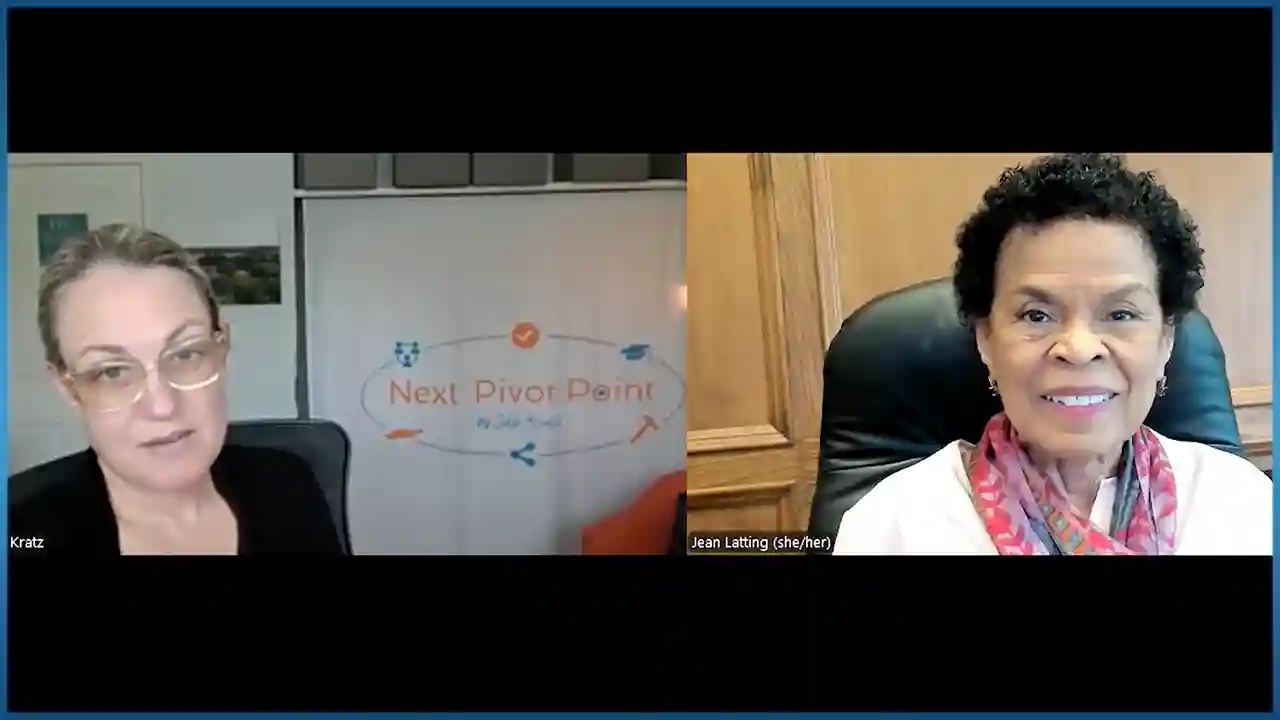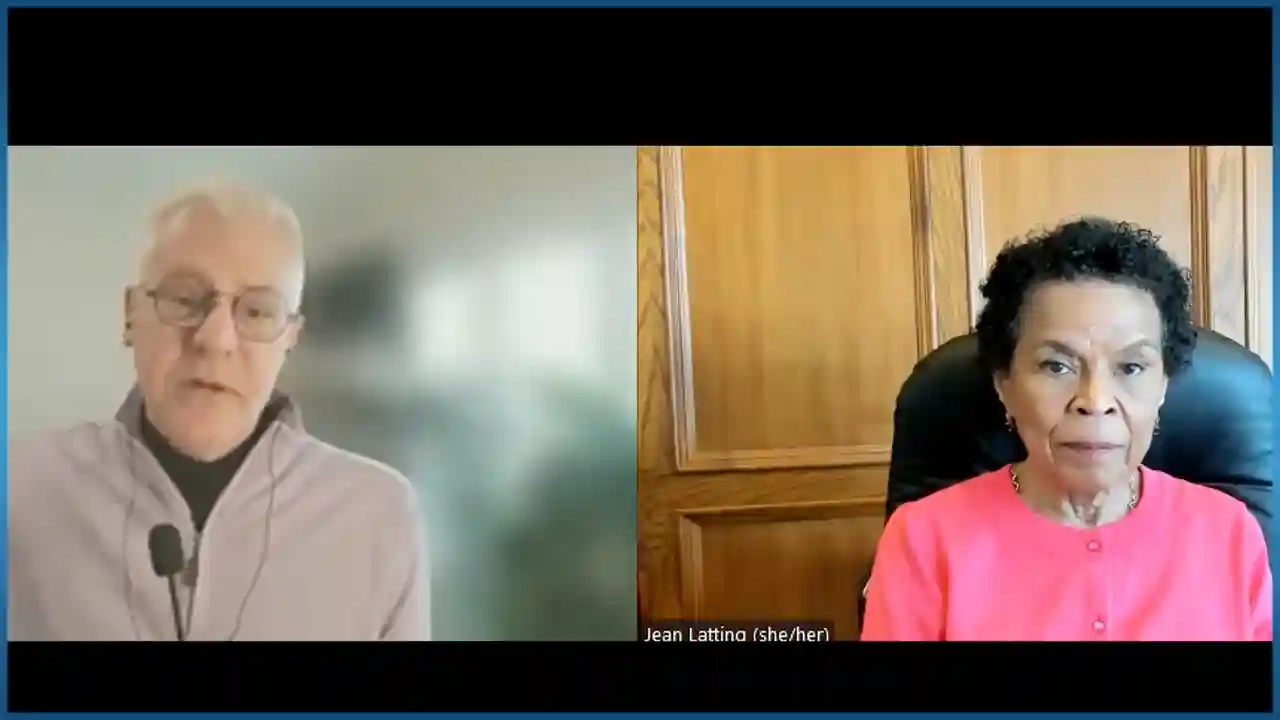


Jean Latting
Julie Kratz, a renowned expert in allyship, discusses strategies for fostering inclusive leadership and engaging those who are persuadable but uncertain.


Jean Latting
Dr. Brad Johnson, a White male clinical psychologist who has spent most of his professional life learning and teaching how to encourage female talent.


Jean Latting
Dr. Beth Kaplan, in her introduction to her new book Braving the Workplace: “I know what it's like to be unseen, unheard and unhappy."


Jean Latting
Suneel Gupta will tell you that finding everyday dharma in the midst of a challenging life is not measured by outward success, nor by achievement, but by finding your essence.


Jean Latting
Jean interviews Craig Dowden, author of A Time to Lead: Mastering Your Self… So You Can Master Your World and positive psychology coach.


Jean Latting
Jean interviews Minal Bopaiah, author of Equity: How to Design Organizations Where Everyone Thrives. She has much to say about the long and complicated path for DEI.


Jean Latting
What do these two historically oppressed groups, Holocaust Museum Houston and the Kinsey Collection of African American Art, have in common?


Jean Latting
Houston mourns Rev. William Lawson, founder and pastor emeritus of Wheeler Avenue Baptist Church.


Jean Latting
Lisa Fain speaks with Jean about the growth potential for mentors and mentees when they truly speak with, listen to, and respect each other’s personhood.


Jean Latting
Instead of being shamed for an error you made, you were supported in redressing the situation. How did it affect your sense of responsibility and ownership?


Jean Latting
In this podcast, Hamza Khan and Jean Latting engage in an animated conversation about leadership, resilience, belonging, and burnout.


Jean Latting
Jean addresses an issue in publishing her new book where she was confronted with the highly offensive misdeeds of one of her heroes. Read how she worked her way through it.


Jean Latting
Amri Johnson has a few provocative things to say about the current state of efforts toward diversity, equity, and inclusion.


Jean Latting
Jean sums up her history of optimism, the arc of social justice, and the deliberate steps one has to take to keep an eye on the prize.


Jean Latting
Jean discusses transitional justice and the race class narrative: what works, what doesn’t, and how to stay the course.


Jean Latting
Given our country’s long and difficult history with inclusiveness, Jean decided to sit down and write out her thoughts – during this year’s Black History Month.


Jean Latting
How do you self-identify? Our identities affect our allyship with those who are being marginalized because of one or more of their identities.


Jean Latting
Jean interviews Daniel Oestreich, co-author of two books on what to say to someone, especially people in the workplace, when you are afraid to say it.


Jean Latting
How do you even begin to articulate a goal that lights you up, not to mention working toward it? Jean has some thoughts.


Leading Consciously
We envision a world of peace, mutual support, and mutual responsibility, including intolerance for hunger, climate action, responsible news outlets, and compassionate leadership.


Jean Latting
Nina proposes susceptibility to harmful radiation and absorption of Vitamin D as the simple explanation for why people have different skin colors, a product of evolutionary adaptation.


Jean Latting
Jean started listening to Steve Kerr, coach of the Golden State Warriors, honing in on his leadership skills. She was blown away by his insights.


Jean Latting
Dr. Pratt learned how to follow the whisper of the spirit, work within and without the system, address racism and sexism head on, and promote impactful diversity initiatives.


Jean Latting
Brain fog is a trap we fall into when our emotional reaction to a negative experience keeps us frozen. If we don’t have tools to keep us moving, we get stuck where it hurts the most.


Jean Latting
In today’s world, leadership is not about telling people what to do. Rod McCowan trains leaders to consider moral principles when making decisions.


Jean Latting
Studies show the benefits of affirming our value, yet we hesitate to share these affirmations with others.


Jean Latting
Victor Varnado, born with albinism, chose to beat the odds stacked against him in life by using his comedic skills to pursue his dreams.


Mike Todt
The Gross National Happiness Index exists, and it works in Bhutan as well as other countries. Mike writes of his upcoming visit to Bhutan to see this phenomenon in action.


Jean Latting
Sherra Aguirre speaks with Jean about the leadership role she took on in her community to promote changing the typical African American diet.


Jean Latting
In June of 2023, the Supreme Court ruled against the use of affirmative action in college admission.


Jean Latting
Ilana Redstone says the Certainty Trap happens when we have moral principles we are 100% sure of and shut out any objections to the contrary.


Carole Marmell
We realized my brother was gay when his photo was on the cover of Time magazine titled “The Homosexual in America”.


Jean Latting
Elizabeth Melendez Fisher Good was burned out and ended up with a mission to address sex trafficking.


Jean Latting
Research shows that groups who put in the effort to welcome diversity and promote inclusiveness may have more conflicts but are also more productive and innovative.


Jean Latting
Joanna Cea and Jess Rimington wrote Beloved Economies: Transforming How We Work, that invites us to reimagine work and reimagine capitalism.


Jean Latting
The most successful people in any field know how to seek the expertise of other successful people in order to improve themselves and their performance.


Jean Latting
Dr. Melissa Ochoa has a few things to say about the word Latinx; mainly, she doesn’t like it. For one thing, it doesn’t work in Spanish. Hear what she proposes instead.


Carole Marmell
Unsung heroes are all around us. Many were women; in many cases, their work was known but men took the credit.


Jean Latting
After George Floyd's murder, Ronald McDonald House-Houston wanted to make a difference for their staff and also their families across the world.


Jean Latting
Journalist Talia Lavin began a social experiment aimed at understanding and exposing the White nationalist movement.


Jean Latting
What happens when you lead with love? Helen Stagg talks about how making change starts with honest, respectful, direct, and open conversations.


Jean Latting
What is the culture – police and American – that allows this to continue? What are the obstacles? What can we as individuals do about it?


Julie Kratz, a renowned expert in allyship, discusses strategies for fostering inclusive leadership and engaging those who are persuadable but uncertain.


Dr. Brad Johnson, a White male clinical psychologist who has spent most of his professional life learning and teaching how to encourage female talent.


Dr. Beth Kaplan, in her introduction to her new book Braving the Workplace: “I know what it's like to be unseen, unheard and unhappy."


Suneel Gupta will tell you that finding everyday dharma in the midst of a challenging life is not measured by outward success, nor by achievement, but by finding your essence.


Jean interviews Craig Dowden, author of A Time to Lead: Mastering Your Self… So You Can Master Your World and positive psychology coach.


Jean speaks with Malia Lazu about DEI in banking.


Jean interviews Minal Bopaiah, author of Equity: How to Design Organizations Where Everyone Thrives. She has much to say about the long and complicated path for DEI.


What do these two historically oppressed groups, Holocaust Museum Houston and the Kinsey Collection of African American Art, have in common?


Jean speaks with Dr. Myrtle Bell about the enduring value and strength of diversity.


Houston mourns Rev. William Lawson, founder and pastor emeritus of Wheeler Avenue Baptist Church.


Lisa Fain speaks with Jean about the growth potential for mentors and mentees when they truly speak with, listen to, and respect each other’s personhood.


Instead of being shamed for an error you made, you were supported in redressing the situation. How did it affect your sense of responsibility and ownership?


In this podcast, Hamza Khan and Jean Latting engage in an animated conversation about leadership, resilience, belonging, and burnout.


Jean addresses an issue in publishing her new book where she was confronted with the highly offensive misdeeds of one of her heroes. Read how she worked her way through it.


Amri Johnson has a few provocative things to say about the current state of efforts toward diversity, equity, and inclusion.


Jean sums up her history of optimism, the arc of social justice, and the deliberate steps one has to take to keep an eye on the prize.


Jean discusses transitional justice and the race class narrative: what works, what doesn’t, and how to stay the course.


Given our country’s long and difficult history with inclusiveness, Jean decided to sit down and write out her thoughts – during this year’s Black History Month.


How do you self-identify? Our identities affect our allyship with those who are being marginalized because of one or more of their identities.


Jean interviews Daniel Oestreich, co-author of two books on what to say to someone, especially people in the workplace, when you are afraid to say it.


How do you even begin to articulate a goal that lights you up, not to mention working toward it? Jean has some thoughts.


We envision a world of peace, mutual support, and mutual responsibility, including intolerance for hunger, climate action, responsible news outlets, and compassionate leadership.


Nina proposes susceptibility to harmful radiation and absorption of Vitamin D as the simple explanation for why people have different skin colors, a product of evolutionary adaptation.


Jean started listening to Steve Kerr, coach of the Golden State Warriors, honing in on his leadership skills. She was blown away by his insights.


Dr. Pratt learned how to follow the whisper of the spirit, work within and without the system, address racism and sexism head on, and promote impactful diversity initiatives.


Brain fog is a trap we fall into when our emotional reaction to a negative experience keeps us frozen. If we don’t have tools to keep us moving, we get stuck where it hurts the most.


In today’s world, leadership is not about telling people what to do. Rod McCowan trains leaders to consider moral principles when making decisions.


Studies show the benefits of affirming our value, yet we hesitate to share these affirmations with others.


Victor Varnado, born with albinism, chose to beat the odds stacked against him in life by using his comedic skills to pursue his dreams.


The Gross National Happiness Index exists, and it works in Bhutan as well as other countries. Mike writes of his upcoming visit to Bhutan to see this phenomenon in action.


Sherra Aguirre speaks with Jean about the leadership role she took on in her community to promote changing the typical African American diet.


In June of 2023, the Supreme Court ruled against the use of affirmative action in college admission.


Ilana Redstone says the Certainty Trap happens when we have moral principles we are 100% sure of and shut out any objections to the contrary.


We realized my brother was gay when his photo was on the cover of Time magazine titled “The Homosexual in America”.


Elizabeth Melendez Fisher Good was burned out and ended up with a mission to address sex trafficking.


Research shows that groups who put in the effort to welcome diversity and promote inclusiveness may have more conflicts but are also more productive and innovative.


Joanna Cea and Jess Rimington wrote Beloved Economies: Transforming How We Work, that invites us to reimagine work and reimagine capitalism.